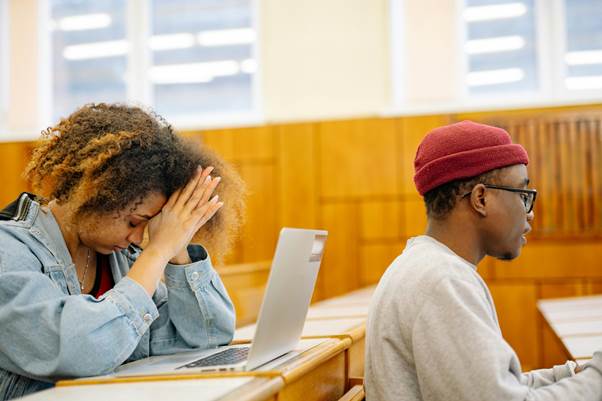The modern society has made attention a need without spoken words. Among the notifications, group messaging, lectures, side work and the option to scroll social media endlessly, being focused has never been more challenging, especially when a student needs to accomplish coursework, meet deadlines, and exist in the real world.
It often starts with one message. It then turns to a new TikTok trend, a meme hole, and in a second, you have already forgotten your study alarm. You are not the only one who does this. You are stuck in a digital dilemma to a point where the productivity tools and distractions are put on the same screen.

This guide takes you through the big questions on how students can live and prosper in a 24/7 connected world - establishing boundaries, how to focus and how to exploit the technology. Whether you are a first-year undergraduate student, a post-graduate medical student, or are just writing your final dissertation, these tips will allow you to find a balance between your ambition and concentration.
The Digital Overload and Reality of Remote Learning
The pandemic has brought to light one thing and it is true for every school. Education is now largely digital.
We now have E-submissions, online classes, research databases and digital libraries are now becoming the norm.
Access to learning has never been as easy and attention-grabbing as it is now. In a report by Times Higher Education (2024), more than 68 per cent of the students at the university report issues with concentration during online classes. Fifty-four per cent of them also check their phones at least once every ten minutes when studying.
And it is not the issue of laziness, but it is the issue of design. The new platforms are designed in such a way that you scroll and not study. The remote learning is exhausting, and so is being always attached to the internet; there is no in between.
Accordingly, the initial move towards improved concentration does not mean the removal of all the apps. It is making your world deliberately: of helpful technology, not destructive, to your purpose.
Determine Your Distraction Triggers.
There is digital distractor for any student.
For some, it's TikTok. On the other hand, the WhatsApp or the YouTube tutors magic-wand people into gaming videos.
Begin with one week of observation of your habit:
- At what time are you most likely to lose concentration?
- What is drawing you to study for hours?
- Are you a multitasker, or are you too frequent a switcher?
After identifying what triggers you, you can create attainable limits. For example:
Use an app blocker, such as Freedom, Forest or Stay Focused, into your schedule to have social media breaks.
Read on your phone physically.
Take a second device policy - do not use your phone to do your academic work, and do not use your laptop when you are with your family.
It must be borne in mind that self-control is no deprivation. It's about direction.

The Art of Attention: Train your brain, and avoid working against it
Multitasking is not something that your brain was designed to do. The psychological feeling of exhaustion related to the transition between a Zoom lecture and Instagram stories can be referred to as attention residue and negatively affects retention and productivity.
These simple changes are the ones that create change. For instance, Cal Newport is a productivity expert who thinks that the skill to do deep work is increasingly becoming rare as well as more valuable. Deep focus can literally may make you shine, in your education as well as in your career.
Wise use of Technology
Techncology isn't the enemy, it is your partner, a tool to help you move forward. It is predisposed to make it work on your side and not on your side.
Here's how:
Plan, follow your goals and activities with the help of tools as Notion, Trello, or Google Keep. Just organize your life according to the goals you want to achieve.
Write good notes on the web: It is possible to sort readings and references with Obsidian or Evernote.
Automate time-intensive processes: Saving time to reference: Citation generators, referencing software (such as Zotero) and AI tutors are time-saving.
Build virtual borders
More than anything, build a ritual of taking time off at night. Have a regular time for which you can go to sleep. Just make sure there’s no study or browsing social media past 9 PM. Give it time to rest.
With the conscious management of your online tools, technology will be a successful distractor.
Finding a balance, not burnout: Academic and Social life.
You are getting ready to be independent, to control your expectations and make your career. However, you can find himself on the wrong path of doing everything.
Such is the case: you need not.
Concentrate on equilibrium and not excellence. Time will be scheduled just as in the study. Make new friends, join a club, volunteer, and all sorts of those were the good things that count as an A+ essay.
As soon as the burnout sets in, take a break and inquire:
- What's draining me right now?
- Am I learning or sitting at a computer monitor because I am guilty?
- Does academic support make a difference?
Most students are not ready to seek help as they believe that they will be seen as cheats, out to take shortcuts. Professional academic help is, in fact, a matter of learning better and not cutting corners.
The websites such as TopUrgentEssays will get you professional tutors who will help you in writing your essay, organising your research, referencing and bibliographies, where many have been unable to get the necessary marks.
Consider it personalised mentoring:
- You get feedback on your work.
- You get to know the academic norms in a shorter time.
- Reliability and trust are built up.
The most outstanding students do not study alone; they are always part of support groups.
With the changing nature of the academic dynamics, the shift to one-on-one learning being the new trend, online tutoring has become one of the most effective predictors of high achievement and student satisfaction.
Students spend an average of 2 and a half hours on social media per day on weekdays. Those who use time-management tools or focus applications raised their GPA by 12 points. In the UK, more than three-quarters of students are getting some online education support.
It is a noticeable trend and it is better to be balanced and considerate than to just work hard. Distractions by means of digital media should not be avoided but instead used intentionally.
Building Your "Focus Toolkit"
Get support from all the areas you can. Commune with friends and seek advice from your professors.
Go to the library with friends and make sure you have a strong community that will help you deliver the best results.

It is to make technology, time and self-consciousness one thing that you do every day.
You are first, a human before you are a student. And productivity is not just a question of how much one studies, but how one studies. The internet can be excessive, but you can draw boundaries to save your energy, creativity and psychological well-being.
The second time you are going to sit and study, turn off the noise, focus your mind, and remind yourself of your objective for that session.
This is to say that you're not lazy. You are simply living in a world that is meant to rob your attention. Now you can afford to take it back - to establish focus, balance and confidence session after session.
And that is what we do at Toptutors. It may be learning how to write an essay, learning how to format in-text references, or learning how to format a bibliography; our group has you covered in your first draft until your final paper.
We have helped thousands of students to be admitted into the finest graduate programs across the globe through our academic advisory services. We also guarantee results since we provide referencing to full essay writing support.
